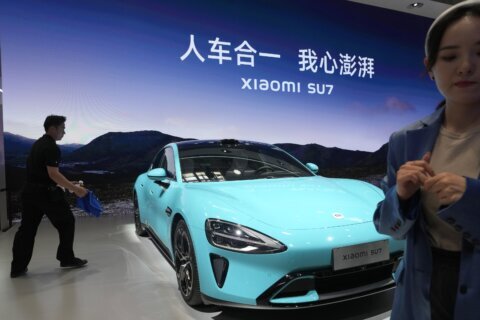TOKYO (AP) — What’s koi got to do with it? Souring relations between Asian rivals Japan and China now seem to be snagged on calm-inducing beauty in spas, museums and gardens. The slippery dispute between Asia’s two biggest economies adds to their spat over Japan’s release into the sea of treated but radioactive water from the tsunami-hit Fukushima nuclear power plant. And it has prompted more questions than answers.
Here’s what you need to know about the fish and their role in the dispute:
WHAT ARE KOI?
Koi are beautifully hued and expensive carp formally called nishikigoi in Japan. The fish, appreciated as “swimming jewels,” represent good luck in life and business. They’re often fixtures of garden ponds for wealthy and influential families in Japan. In recent years, koi have become hugely popular in Asia, with Japan’s koi exports doubling over the past decade to 6.3 billion yen ($43 million) — one-fifth of them shipped to China, the top Japanese koi importer, followed by the United States and Indonesia.
WHAT HAPPEND TO KOI EXPORTS TO CHINA?
Since an outbreak of koi herpes virus in Japan in the 2000s, the country conducts a compulsory quarantine of 7-10 days for all exports, including to China, to make sure the koi are disease-free.
Initially, China had export deals with a total of 15 growers that also provided quarantine, allowing them to skip a separate quarantine process at another facility. But Beijing let many of the contracts expire over the years. Now, China also has not renewed the last remaining pre-export quarantine deal that expired Oct. 30, Japanese officials said.
Not renewing the contract effectively ends China’s import of koi fish from Japan. Fisheries Agency official Satoru Abe, in charge of koi quarantine, said China has not provided any explanation as to why it hasn’t taken the necessary steps to continue koi shipments.
IS THIS RELATED TO FUKUSHIMA DAIICHI’S TREATED WASTEWATER RELEASE?
Despite safety assurances from the International Atomic Energy Agency, Japan’s government and the nuclear plant’s operator, China banned Japanese seafood immediately after the tsunami-hit Fukushima Daiichi nuclear power plant started discharging treated and diluted radioactive wastewater. There have been concerns internationally about seafood caught from parts of the Pacific where the treated wastewater is being released, but koi are freshwater fish that are ornamental and not typically eaten.
Abe, the koi quarantine official, said Fukushima’s wastewater release is unlikely to be the cause of the koi export stoppage, noting that China allowed Japanese koi in for two months after the water discharge began.
WHAT ARE JAPANESE OFFICIALS SAYING?
Top Japanese officials say Tokyo submitted the necessary documents to facilitate koi export renewals well before the deadline, and will continue diplomatic efforts to resolve the deadlock. Agriculture, Forestry and Fisheries Minister Ichiro Miyashita told reporters, “Nishikigoi is culture, and fundamentally different from seafood, and I believe it is not related” to the Fukushima Daiichi treated water discharge. “But China has taken scientifically groundless measures, and we need to speak up and call for a withdrawal of practices that lack rationality and distort trade.”
Chief Cabinet Secretary Hirokazu Matsuno said Japan will continue approaching Chinese authorities about taking necessary steps to resume the koi trade.
WHAT ELSE IS CAUSING TENSION BETWEEN JAPAN AND CHINA?
The two countries have a decadeslong dispute over a cluster of East China Sea islands that Japan controls and calls Senkaku, which Beijing also claims and calls the Diaoyu. Beijing rotates a set of four coast guard boats that routinely violate the Japanese-claimed water around the islands, adding tension with Japanese coast guard patrol vessels and fishing boats.
Tokyo considers China to be a major security threat in the region and is expanding its defense partnerships with other Indo-Pacific nations in addition to its only treaty ally, the United States. Tokyo is also pushing for a military buildup under the new national security strategy that calls for counterstrike capability by long-range missiles in a break from Japan’s postwar self-defense-only principle.
Copyright © 2024 The Associated Press. All rights reserved. This material may not be published, broadcast, written or redistributed.






